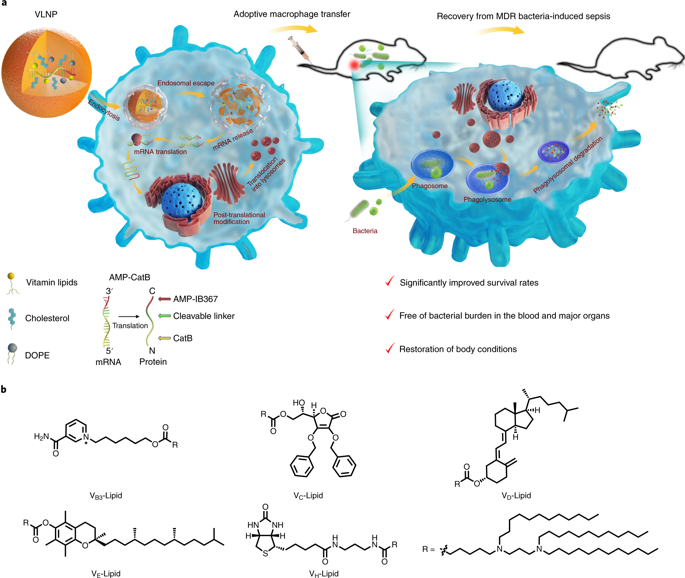Nature Nanotechnology ( IF 38.3 ) Pub Date : 2020-01-06 , DOI: 10.1038/s41565-019-0600-1 Xucheng Hou 1 , Xinfu Zhang 1, 2 , Weiyu Zhao 1 , Chunxi Zeng 1 , Binbin Deng 3 , David W McComb 3, 4 , Shi Du 1 , Chengxiang Zhang 1 , Wenqing Li 1 , Yizhou Dong 1, 5

|
Sepsis, a condition caused by severe infections, affects more than 30 million people worldwide every year and remains the leading cause of death in hospitals1,2. Moreover, antimicrobial resistance has become an additional challenge in the treatment of sepsis3, and thus, alternative therapeutic approaches are urgently needed2,3. Here, we show that adoptive transfer of macrophages containing antimicrobial peptides linked to cathepsin B in the lysosomes (MACs) can be applied for the treatment of multidrug-resistant bacteria-induced sepsis in mice with immunosuppression. The MACs are constructed by transfection of vitamin C lipid nanoparticles that deliver antimicrobial peptide and cathepsin B (AMP-CatB) mRNA. The vitamin C lipid nanoparticles allow the specific accumulation of AMP-CatB in macrophage lysosomes, which is the key location for bactericidal activities. Our results demonstrate that adoptive MAC transfer leads to the elimination of multidrug-resistant bacteria, including Staphylococcus aureus and Escherichia coli, leading to the complete recovery of immunocompromised septic mice. Our work provides an alternative strategy for overcoming multidrug-resistant bacteria-induced sepsis and opens up possibilities for the development of nanoparticle-enabled cell therapy for infectious diseases.
中文翻译:

维生素脂质纳米粒可实现过继性巨噬细胞转移以治疗耐多药细菌性脓毒症
脓毒症是一种由严重感染引起的疾病,每年影响全球超过 3000 万人,并且仍然是医院死亡的主要原因1,2。此外,抗菌素耐药性已成为脓毒症治疗中的另一个挑战3,因此迫切需要替代治疗方法2,3. 在这里,我们表明在溶酶体 (MACs) 中过继转移含有与组织蛋白酶 B 连接的抗菌肽的巨噬细胞可用于治疗免疫抑制小鼠的多药耐药细菌诱导的败血症。MACs 是通过转染维生素 C 脂质纳米颗粒构建的,该纳米颗粒提供抗菌肽和组织蛋白酶 B (AMP-CatB) mRNA。维生素 C 脂质纳米颗粒允许 AMP-CatB 在巨噬细胞溶酶体中特异性积累,这是杀菌活性的关键位置。我们的研究结果表明,过继性 MAC 转移可消除耐多药细菌,包括金黄色葡萄球菌和大肠杆菌,导致免疫功能低下的脓毒症小鼠完全康复。我们的工作为克服耐多药细菌引起的败血症提供了一种替代策略,并为开发用于传染病的纳米颗粒细胞疗法开辟了可能性。


























 京公网安备 11010802027423号
京公网安备 11010802027423号